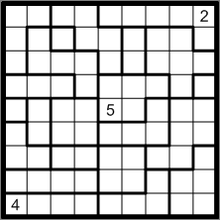Ripple Effect (puzzle)
Ripple Effect (Japanese:波及効果 Hakyuu Kouka) is a logic puzzle published by Nikoli. As of 2007, two books consisting entirely of Ripple Effect puzzles have been published by Nikoli. The second was published on October 4, 2007.

Moderately difficult sample puzzle
© 2005-6 Adam R. Wood, licensed under GFDL
© 2005-6 Adam R. Wood, licensed under GFDL
Rules
Ripple Effect is played on a rectangular grid divided into polyominoes. The solver must place one positive integer into each cell of the grid - some of which may be given in advance - according to these rules:
- Every polyomino must contain the consecutive integers from 1 to the quantity of cells in that polyomino inclusive.
- If two identical numbers appear in the same row or column, at least that many cells with other numbers must separate them. For example, two cells both containing '1' may not be orthogonally adjacent, but must have at least one cell between them with a different number. Two cells marked '3' in the same row or column must have at least three cells with other numbers between them in that row or column, and so on.
History
Ripple Effect is an original puzzle of Nikoli; it first appeared in Puzzle Communication Nikoli #73 (May 1998).
gollark: You can also do fun stuff like read other people's files on that, because without any actual encryption backing it up permissions are pretty useless on single-user systems!
gollark: Microsoft can't stop me! MWAHAHAHA!
gollark: Just boot into linux™ and mount the NTFS partition™?
gollark: The `-nodisp` flag.
gollark: * ffplay
See also
- List of Nikoli puzzle types
- Ripple Effect Puzzle: The mobile game
External links
- http://www.nikoli.co.jp/en/puzzles/ripple_effect.html (English Version)
http://www.nikoli.co.jp/ja/puzzles/ripple_effect/ (Japanese Version)
This article is issued from Wikipedia. The text is licensed under Creative Commons - Attribution - Sharealike. Additional terms may apply for the media files.